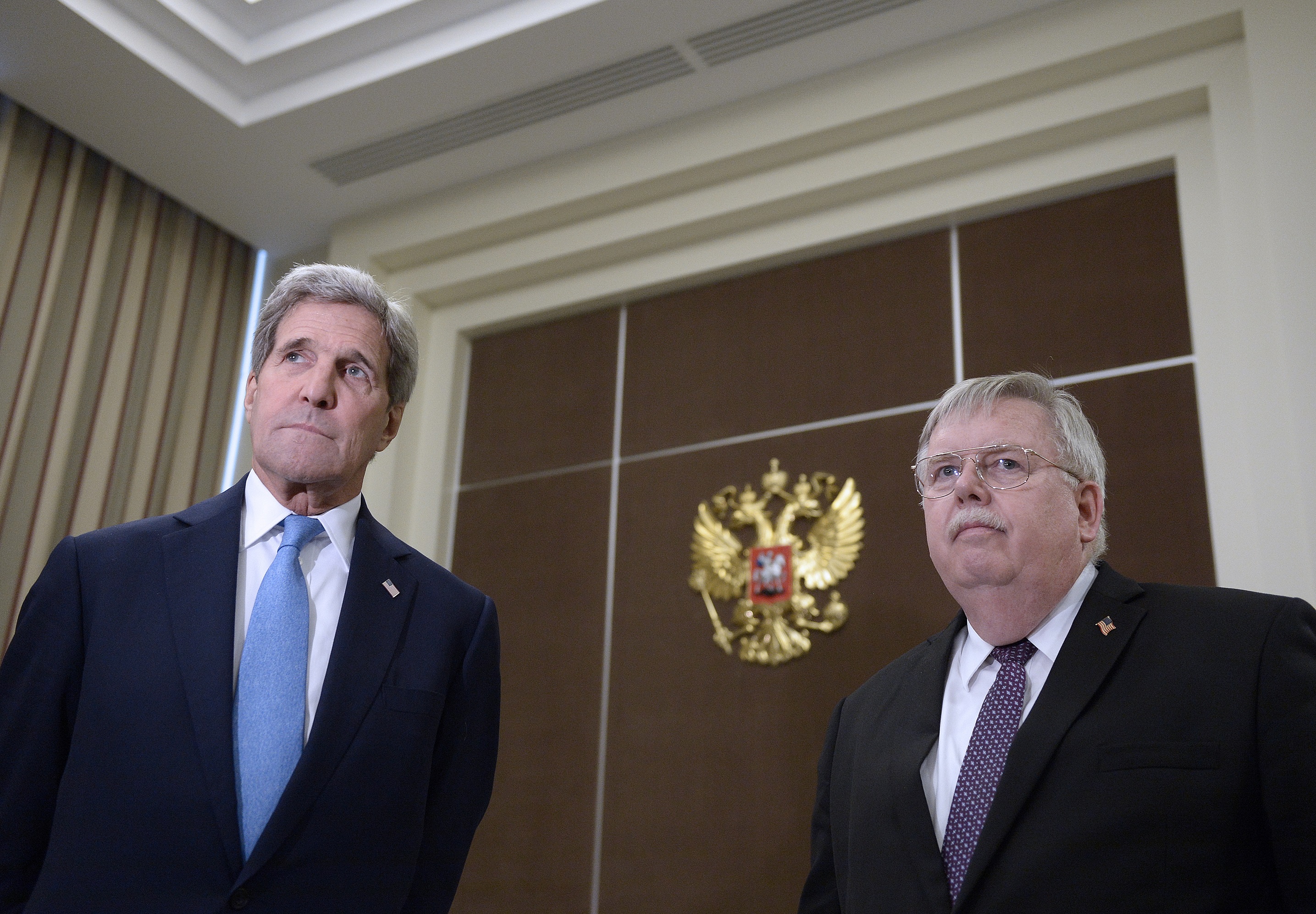ID :
367090
Wed, 05/13/2015 - 11:57
Auther :
Shortlink :
https://oananews.org//node/367090
The shortlink copeid
Anti-Russian sanctions to begin to be rolled back if Minsk deals are implemented - Kerry

SOCHI, May 12. /TASS/. The United States and the European Union will start lifting sanctions against Russia in case the Minsk agreements on Ukraine are implemented in full, US Secretary of State John Kerry said Tuesday after a meeting with Russian President Vladimir Putin and Russian Foreign Minister Sergey Lavrov.
"If Minsk is fully implemented, it is clear the US and EU sanctions will begin to be rolled back," Kerry said.
He confirmed that the United States insists of full implementation of the Minsk deals.
"These agreements must be fully implemented," the US top diplomat said.
He said Russia and the United States agree on many aspects but still have differences about details.
Kerry continued that Moscow and Washington agree on the most important thing: the problem in Ukraine may be fully solved on condition of the Minsk agreements implementation. "And we both, all of us and other friends and allies, have responsibilities to undertake in order to effect that implementation," he said.
"We really believe that a genuine ceasefire in Shirokino needs to be undertaken," Kerry said. "I think [Foreign Minister] Sergey [Lavrov] and President [Vladimir] Putin agreed that that is important as well as the withdrawal of weapons and demilitarization and monitoring by the OSCE."
Sanctions
Russian officials and companies came under the first batch of Western sanctions, including visa bans and asset freezes, after Russia incorporated Crimea in mid-March 2014 after the February 2014 coup in Ukraine.
Despite Moscow’s repeated statements that the Crimean referendum on secession from Ukraine was in line with the international law and the UN Charter and in conformity with the precedent set by Kosovo’s secession from Serbia in 2008, the West and Kiev have refused to recognize the legality of Crimea’s reunification with Russia.
The West announced new, sectoral, restrictions against Russia in late July 2014, in particular, for what the West claimed was Moscow’s alleged involvement in protests in Ukraine’s southeast.
In response, Russia imposed on August 6, 2014 a one-year ban on imports of beef, pork, poultry, fish, cheeses, fruit, vegetables and dairy products from Australia, Canada, the European Union, the United States and Norway.
New large-scale punitive measures against Russia followed in September and December 2014.
Russia has constantly dismissed accusations of "annexing" Crimea, because Crimea reunified with Russia voluntarily after a referendum, as well as allegations that Moscow could in any way be involved in hostilities in the southeast of Ukraine.
East Ukrainian developments
Clashes between Ukrainian troops and local militias in the Donetsk and Lugansk regions during Kiev’s military operation, conducted since mid-April 2014, to regain control over parts of the breakaway territories, which call themselves the Donetsk and Lugansk People's republics, have left thousands dead and forced hundreds of thousands of people to flee Ukraine’s embattled east.
The parties to the Ukrainian conflict mediated by the Organization for Security and Cooperation in Europe agreed on a ceasefire at talks in September 2014 in the Belarusian capital Minsk two days after Vladimir Putin proposed his plan to settle the situation in the east of Ukraine.
The ceasefire has reportedly been numerously violated since. There have been several meetings of the Trilateral Contact Group on east Ukrainian settlement comprising representatives of Russia, Ukraine and the OSCE and of the Normandy Four (Russia, Ukraine, France and Germany) aimed at finding ways to diplomatically and politically settle the intra-Ukrainian conflict.
On February 12, 2015 participants of the Contact Group signed in Minsk a document earlier agreed with leaders of the Normandy Four.
The 13-point document, entitled the Package of Measures on implementation of the September 2014 Minsk agreements, in particular included cessation of fire from February 15, withdrawal of heavy armaments, as well as measures on long-term political settlement in Ukraine, including establishment of working subgroups.
The subgroups focus on four areas: economic issues and restoration of facilities; refugees, internally displaced persons and humanitarian assistance; political issues; security issues.
Read more





